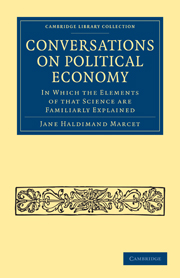Book contents
- Frontmatter
- PREFACE
- Contents
- CONVERSATION I INTRODUCTION
- CONVERSATION II INTRODUCTION—continued
- CONVERSATION III ON PROPERTY
- CONVERSATION IV PROPERTY—continued
- CONVERSATION V ON THE DIVISION OF LABOUR
- CONVERSATION VI ON CAPITAL
- CONVERSATION VII CAPITAL—continued
- CONVERSATION VIII ON WAGES AND POPULATION
- CONVERSATION IX WAGES AND POPULATION—continued
- CONVERSATION X ON THE CONDITION OF THE POOR
- CONVERSATION XI ON REVENUE
- CONVERSATION XII REVENUE FROM LANDED PROPERTY
- CONVERSATION XIII REVENUE FROM THE CULTIVATION OF LAND
- CONVERSATION XIV REVENUE FROM CAPITAL LENT
- CONVERSATION XV ON VALUE AND PRICE
- CONVERSATION XVI ON MONEY
- CONVERSATION XVII MONEY—continued
- CONVERSATION XVIII COMMERCE
- CONVERSATION XIX ON FOREIGN TRADE
- CONVERSATION XX FOREIGN TRADE—cont.
- CONVERSATION XXI ON EXPENDITURE
- INDEX
CONVERSATION XVII - MONEY—continued
Published online by Cambridge University Press: 07 September 2011
- Frontmatter
- PREFACE
- Contents
- CONVERSATION I INTRODUCTION
- CONVERSATION II INTRODUCTION—continued
- CONVERSATION III ON PROPERTY
- CONVERSATION IV PROPERTY—continued
- CONVERSATION V ON THE DIVISION OF LABOUR
- CONVERSATION VI ON CAPITAL
- CONVERSATION VII CAPITAL—continued
- CONVERSATION VIII ON WAGES AND POPULATION
- CONVERSATION IX WAGES AND POPULATION—continued
- CONVERSATION X ON THE CONDITION OF THE POOR
- CONVERSATION XI ON REVENUE
- CONVERSATION XII REVENUE FROM LANDED PROPERTY
- CONVERSATION XIII REVENUE FROM THE CULTIVATION OF LAND
- CONVERSATION XIV REVENUE FROM CAPITAL LENT
- CONVERSATION XV ON VALUE AND PRICE
- CONVERSATION XVI ON MONEY
- CONVERSATION XVII MONEY—continued
- CONVERSATION XVIII COMMERCE
- CONVERSATION XIX ON FOREIGN TRADE
- CONVERSATION XX FOREIGN TRADE—cont.
- CONVERSATION XXI ON EXPENDITURE
- INDEX
Summary
CAROLINE
I HAVE been reflecting much upon the subject of our last conversation, Mrs. B.; and it has occurred to me that though there may be no permanent excess and depreciation of specie in any particular country, yet it must gradually decrease in value throughout the world: for money is very little liable to wear; a great quantity of the precious metals is annually extracted from the mines, and though a considerable portion of it may be converted into plate and jewellery, yet the greater part, I suppose, goes to the mint to be coined, and this additional quantity must produce a depreciation of value?
MRS. B
An increase of supply will not occasion depreciation of value, if there should at the same time be a proportional increase of demand, and we must recollect that the consumable produce of the earth increases as well as that of the mines — the commodities to be circulated as well as the medium of circulation; and it is not the actual quantity of money, but the proportion which it bears to the quantity of commodities for which it is to serve as a medium of exchange, that regulates the price of those commodities.
Let us suppose the price of a loaf of bread to be one shilling; and say, if 1000 more loaves of bread be produced every year by agriculture, and such an additional number of shillings be obtained from the mines as will be necessary to circulate them, the price of a loaf will then remain the same, and the value of money will not, by this additional quantity of specie, be depreciated.
- Type
- Chapter
- Information
- Conversations on Political EconomyIn Which the Elements of that Science are Familiarly Explained, pp. 318 - 341Publisher: Cambridge University PressPrint publication year: 2010First published in: 1816



